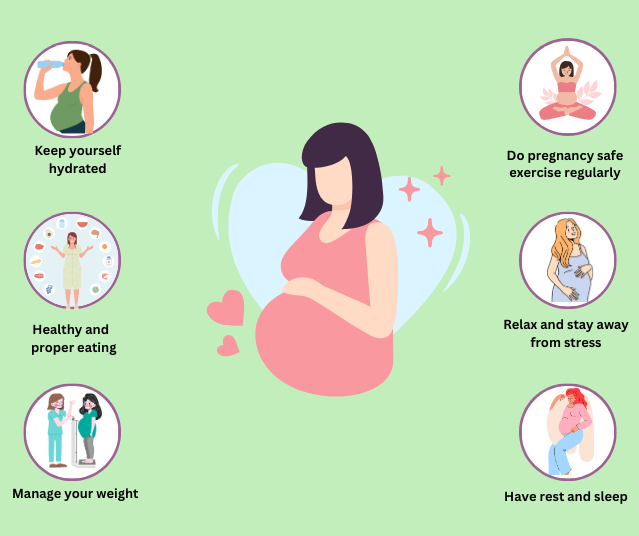Pregnancy is a beautiful journey filled with physical and emotional changes. Taking care of your health during this time is crucial—not only for your own well-being but also for the growth and development of your baby. By prioritizing proper pregnancy care, you can support a smoother, healthier pregnancy and feel your best throughout this transformative experience.
Pregnancy care encompasses several key areas, including nutrition, hydration, exercise, and mental well-being. Each of these plays a vital role in ensuring both you and your baby stay healthy throughout the nine months. In this guide, we’ll explore the essential tips and practices to help you maintain optimal health and a glowing pregnancy.

Introduction to Pregnancy Care
Pregnancy care is the cornerstone of a healthy and smooth pregnancy. Understanding the changes your body goes through and how to manage them is the first step toward a successful pregnancy journey. Your body is working hard to nurture and support new life, so prioritizing extra care for yourself is essential.
The most important elements of pregnancy caring include proper nutrition, regular exercise, staying hydrated, and maintaining emotional balance. By paying attention to these areas, you can ensure that you feel good, look radiant, and have a positive pregnancy experience.
Nutrition for Optimal Pregnancy Care
Pregnancy care is a vital journey where a mother’s nutritional choices play a crucial role in both her own health and the development of her baby. A well-balanced diet is essential to ensure that both the mother and the growing baby receive the necessary nutrients. By focusing on an optimal nutrition plan, mothers can help reduce complications, promote healthy fetal growth, and support their overall well-being throughout pregnancy and beyond.
Key Nutrients for Pregnancy Care
-
Folic Acid
Folic acid is a critical nutrient in early pregnancy, helping to prevent neural tube defects such as spina bifida. The recommended daily intake is 400–800 micrograms. Sources include leafy green vegetables, fortified cereals, beans, and oranges. -
Iron
Pregnancy care involves ensuring adequate iron intake to support increased blood volume and prevent anemia, which is common during pregnancy. Low iron levels can lead to fatigue and increase the risk of preterm delivery and low birth weight. Iron-rich foods, such as lean meats, fish, leafy greens
-
Calcium
Calcium supports fetal bone and tooth development and helps prevent maternal bone density loss. Pregnant women should aim for 1,000 mg of calcium daily. Good sources are dairy products, fortified plant-based milk, leafy greens, and tofu. -
Protein
Protein intake should be slightly increased during pregnancy to support fetal tissue growth, including the brain. The general recommendation is about 70–100 grams per day, depending on the individual. High-quality protein sources include lean meats, fish, eggs, dairy, legumes, nuts, and seeds. -
DHA and Omega-3 Fatty Acids
DHA (a type of Omega-3 fatty acid) is crucial for fetal brain and eye development. Sources include fatty fish such as salmon and sardines, as well as fortified foods and supplements. Pregnant women should aim for 200–300 mg of DHA daily. -
Vitamin D
Vitamin D aids in calcium absorption and supports fetal bone development. Pregnant women should aim for 600 IU daily. Safe sun exposure and foods like fortified milk, eggs, and fatty fish are great sources. -
Fiber
High-fiber foods help alleviate constipation, which is common during pregnancy. Fiber-rich foods include whole grains, fruits, vegetables, legumes, and seeds. Drinking plenty of water further supports digestive health. -
Hydration
Staying hydrated supports blood volume, amniotic fluid levels, and nutrient transport to the fetus. Pregnant women are advised to drink at least 8–10 glasses of water daily, increasing intake in warmer climates or if active.
Meal Planning for Pregnancy Care
-
Breakfast: Include a whole grain (such as oatmeal or whole-grain bread), a protein source (eggs or yogurt), and a fruit for vitamins and fiber. Add leafy greens to smoothies for an extra nutrient boost.
-
Lunch: Incorporate a lean protein (like chicken, tofu, or fish), whole grains, and colorful vegetables. Add beans or lentils for fiber and an extra dose of protein.
-
Dinner: Aim for a well-rounded plate with protein, grains, and vegetables. Salmon with roasted vegetables and quinoa, for example, provides DHA, fiber, and essential minerals.
-
Snacks: Healthy snacks are an opportunity to increase nutrient intake. Opt for fresh fruit with nuts, whole-grain crackers with cheese, or a small smoothie.
-
Foods to Limit or Avoid for Pregnancy Care
-
Raw or Undercooked Meat and Fish: These foods carry a risk of bacteria that can be harmful to both mother and baby. It’s essential to cook meats and fish thoroughly.
-
High-Mercury Fish: Mercury can affect fetal brain development. Avoid fish like shark, swordfish, and king mackerel. Instead, opt for low-mercury options like salmon, shrimp, and tilapia.
-
Unpasteurized Dairy Products and Soft Cheeses: These can contain bacteria like Listeria, which may cause severe infections. Stick to pasteurized dairy products.
-
Caffeine: High caffeine intake has been associated with an increased risk of miscarriage. Limit caffeine to 200 mg per day, roughly one 12-ounce cup of coffee.
-
Alcohol: Avoid alcohol entirely during pregnancy, as it can cause fetal alcohol spectrum disorders.
Supplements and Pregnancy Care
While whole foods should be the primary source of nutrients, prenatal vitamins are generally recommended as part of pregnancy care. Prenatal vitamins often include folic acid, iron, calcium, and DHA, helping to meet increased nutritional needs. However, always consult with a healthcare provider before taking any supplements, as individual needs can vary.
Know More : PCOD Treatment
Managing Common Pregnancy-Related Nutritional Challenges
-
Morning Sickness: Small, frequent meals with bland foods like crackers or bananas may help. Ginger and vitamin B6 supplements have been shown to reduce nausea.
-
Heartburn: Avoid large meals, spicy foods, and acidic foods. Eating smaller, frequent meals and avoiding lying down immediately after eating can help manage heartburn.
-
Gestational Diabetes: This condition requires careful monitoring of carbohydrate intake. Complex carbs and high-fiber foods help maintain blood sugar stability. Consulting with a nutritionist for a personalized plan is often beneficial.
Importance of Regular Prenatal Check-Ups
Regular prenatal check-ups allow healthcare providers to monitor the mother’s and baby’s health and adjust the nutrition plan as needed. Blood tests may reveal deficiencies that can be corrected with diet adjustments or supplements.
Staying Hydrated: A Key Element of Pregnancy Care
Hydration is a critical component of caring pregnancy. Water plays an essential role in the formation of amniotic fluid, aiding digestion, and flushing out toxins. Proper hydration also helps prevent common pregnancy issues such as swelling, fatigue, and constipation.
How Much Water Should You Drink?
As part of your pregnancy caring, aim to drink at least eight to ten glasses of water each day. Staying hydrated is even more important if you are physically active or live in a warm climate. You can also incorporate hydrating foods such as fruits, cucumbers, and soups into your diet to help meet your fluid needs.
If plain water doesn’t appeal to you, consider adding a slice of lemon or mint leaves to enhance its flavor. This can make drinking water more enjoyable while keeping you hydrated.
Exercise for Pregnancy caring
Regular physical activity is an integral part of pregnancy caring. Exercise helps manage weight, improves circulation, reduces stress, and enhances your mood. It can also prepare your body for the physical demands of labor and delivery.
Safe Exercises During Pregnancy
Not all exercises are safe during pregnancy, so it’s essential to focus on low-impact activities that are easy on your joints and back. Walking, swimming, and prenatal yoga are excellent options for staying active while taking care of your body.
- Walking: Walking is one of the easiest and safest forms of exercise for pregnant women. It helps keep your cardiovascular system strong without putting too much strain on your joints.
- Swimming: Swimming is another excellent choice for care in pregnancy. It provides a full-body workout while alleviating pressure on your joints and reducing swelling.
- Prenatal Yoga: Prenatal yoga helps improve flexibility, balance, and breathing techniques. It also promotes relaxation, which is beneficial for both your physical and mental well-being.
Exercise Cautions in Pregnancy
Before starting any exercise routine, always consult your healthcare provider to ensure it’s safe for your pregnancy. Avoid activities that involve a high risk of falling, heavy lifting, or excessive bouncing. Listen to your body and stop exercising if you feel dizzy, short of breath, or experience pain.
Mental Health: Emotional Balance in Pregnancy Care
Mental and emotional well-being are critical aspects of pregnancy. Pregnancy can bring about a wide range of emotions due to hormonal changes, body image concerns, and the anticipation of becoming a parent. It’s essential to take care of your mental health during this time.
Managing Stress in Pregnancy
Stress can affect your physical health and potentially harm your baby. Incorporating relaxation techniques into your daily routine is a key part of pregnancy caring.
- Meditation and Breathing Exercises: Practicing meditation and deep breathing exercises can help you stay calm and centered during pregnancy. These techniques also prepare you for labor by teaching you how to control your breathing and remain relaxed.
- Prenatal Massages: A prenatal massage can help ease tension in your muscles, reduce anxiety, and improve your overall mood. Make sure to consult with a certified prenatal massage therapist to ensure it’s done safely.
- Sleep: Getting enough sleep is crucial for maintaining mental health during pregnancy. Try to establish a consistent bedtime routine, use supportive pillows, and sleep on your side to improve comfort and restfulness.
Building a Support System for Pregnancy Care
Having a strong support system can make a significant difference in how you feel during pregnancy. Surround yourself with family, friends, or join a prenatal support group where you can share experiences and receive encouragement.
Don’t hesitate to seek professional help if you’re struggling with anxiety, depression, or overwhelming emotions. Your healthcare provider can refer you to a therapist specializing in prenatal care.
Skincare in Pregnancy: Glowing from the Inside Out
Pregnancy is a beautiful journey, and as your body nurtures new life, it undergoes various changes that can impact your skin. Taking good care of your skin during this time isn’t just about aesthetics; it’s a meaningful part of self-care that supports your overall wellness and can help you feel your best. When it comes to Pregnancy Care, knowing how to approach skincare with safety and effectiveness in mind is essential. Let’s dive into how to keep that radiant, healthy glow through skincare during pregnancy.
1. Understanding the Changes in Your Skin
During pregnancy, hormonal fluctuations can lead to changes in skin texture, pigmentation, and sensitivity. For many, the increase in estrogen and progesterone can cause “pregnancy glow” due to enhanced blood flow and oil production. However, some may experience skin challenges like:
- Hyperpigmentation: Dark spots or patches, often around the cheeks, nose, and forehead, known as melasma.
- Acne: Hormonal surges may increase oil production, leading to breakouts.
- Dryness and Itchiness: As the skin stretches and changes, it may feel dry, especially around the belly.
- Sensitivity: Some ingredients you used pre-pregnancy might suddenly cause irritation.
The key is to embrace a safe, gentle skincare routine tailored to these unique needs.
2. Gentle Cleansing is Essential
A mild, sulfate-free cleanser is ideal during pregnancy. It helps in removing dirt and oil without stripping away natural moisture. Choose products free from harsh chemicals like parabens and artificial fragrances, as these can aggravate sensitive skin.
Pregnancy Care Tip: Look for cleansers with calming ingredients such as chamomile, aloe vera, and oat extracts, which cleanse without causing irritation.
3. Hydration and Moisturization
Keeping your skin hydrated is vital to maintaining elasticity and reducing the risk of stretch marks. Use a rich, fragrance-free moisturizer on both your face and body to lock in moisture. For those who experience acne, lightweight, non-comedogenic moisturizers can help keep skin hydrated without clogging pores.
Pregnancy Care Tip: Use natural oils, like almond oil, shea butter, or jojoba oil, on the body for deep hydration. These oils contain vitamins and antioxidants that nourish the skin and support elasticity.
4. Sun Protection to Prevent Hyperpigmentation
Pregnancy hormones can make your skin more susceptible to UV-induced hyperpigmentation, so sunscreen is a must! Choose a mineral-based sunscreen with zinc oxide or titanium dioxide, which are safe and effective for both you and your baby.
Pregnancy Care Tip: Apply a broad-spectrum SPF 30 or higher daily, even on cloudy days, to protect against melasma and sunburn.
5. Targeting Pregnancy Acne with Safe Ingredients
Acne can be tricky to manage during pregnancy, as some common acne-fighting ingredients (like retinoids and salicylic acid) should be avoided. Instead, look for alternatives like:
- Azelaic Acid: A gentle, pregnancy-safe ingredient that helps with acne and pigmentation.
- Lactic Acid: This gentle AHA exfoliates without penetrating deeply, which makes it safer for pregnancy.
- Tea Tree Oil: Known for its natural antibacterial properties, tea tree oil can be effective when diluted and used sparingly.
Pregnancy Care Tip: Speak with a dermatologist to confirm which acne treatments are safe for you, as every pregnancy is unique.
6. Managing Stretch Marks Gently
Stretch marks are a common part of pregnancy, especially on areas like the belly, hips, and thighs. While they can’t always be avoided, proper pregnancy care, including keeping the skin well-moisturized and gently massaging areas prone to stretching, may help minimize their appearance.
Pregnancy Care Tip: Ingredients like vitamin E, cocoa butter, and hyaluronic acid can support skin elasticity. Consider a hydrating body cream specifically formulated for pregnancy to nurture skin as it expands.
7. Ingredients to Avoid During Pregnancy
Some skincare ingredients that are generally safe outside of pregnancy may not be recommended during this time. Here’s a quick list of ingredients to skip in your Pregnancy Care routine:
- Retinoids (often found in anti-aging products) as they can harm fetal development.
- Salicylic Acid in high concentrations, commonly found in acne treatments.
- Hydroquinone for pigmentation, due to high absorption rates.
- Chemical Sunscreens with oxybenzone, as they may disrupt hormones.
Pregnancy Care Tip: When in doubt, consult with your healthcare provider or dermatologist about any skincare ingredients you’re unsure of.
8. Embrace Natural Radiance with a Minimalist Approach
Pregnancy can be the perfect opportunity to simplify your skincare routine. A minimalist and gentle approach aligns with pregnancy care, helping you avoid unnecessary exposure to potentially harmful chemicals while promoting a natural, healthy glow.
Some essential, pregnancy-friendly skincare staples might include:
- A gentle cleanser
- A nourishing moisturizer
- Sunscreen with mineral SPF
- A hydrating oil for areas prone to dryness or stretching
9. Self-Care Beyond Skincare: Diet and Hydration
Pregnancy care isn’t only about the products you apply on your skin—it also includes nourishing your body from within. Eating a balanced diet rich in fruits, vegetables, and lean proteins supports both your baby’s health and your skin’s appearance. Drinking plenty of water helps maintain skin hydration and assists in flushing out toxins.
Preventing Stretch Marks in Pregnancy

Stretch marks are a common concern for many pregnant women. While genetics play a significant role, you can take steps to minimize their appearance.
- Moisturize Regularly: Keeping your skin well-moisturized with creams rich in vitamin E and hyaluronic acid can help maintain its elasticity and reduce the likelihood of stretch marks.
- Maintain a Steady Weight Gain: Rapid weight gain can stretch your skin quickly, leading to more noticeable stretch marks. Aim to gain weight steadily and healthily by following your doctor’s recommendations.
Regular Prenatal Checkups: Essential for Pregnancy Caring
Attending regular prenatal appointments is a vital aspect of pregnancy care. These visits enable your healthcare provider to monitor your baby’s growth and ensure both your health and well-being throughout the pregnancy.
Read More : Pregnancy Health
What to Expect at Prenatal Visits
During your prenatal checkups, your doctor will track your baby’s growth, check your vital signs, and perform tests to detect any potential complications.
- Ultrasounds: Ultrasound scans are performed to visualize your baby’s development and check for any abnormalities.
- Blood Pressure Monitoring: Monitoring your blood pressure is critical to prevent conditions like preeclampsia, which can be dangerous for both you and your baby.
- Glucose Tests: In the second trimester, you’ll likely have a glucose tolerance test to screen for gestational diabetes, a condition that can affect both mother and baby if left untreated.
Conclusion
Pregnancy care is all about nurturing both your body and your baby. By focusing on proper nutrition, staying active, managing stress, and attending regular prenatal checkups, you can enjoy a healthy, glowing pregnancy. Remember, pregnancy is a unique journey, and every woman’s experience is different. Prioritizing self-care and surrounding yourself with support will make this remarkable time in your life as smooth and joyful as possible.









